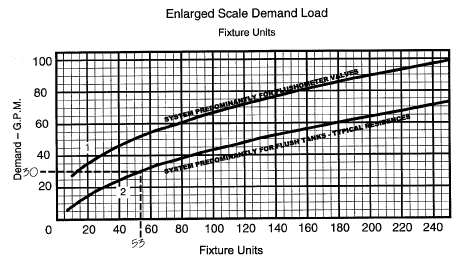Hi All,
We are in the process of starting to build a 5 bedroom house on a piece of property in North Carolina and wondering what size water line we may need.
Here is all the pertinent information I could think of:
The house will sit on a 3/4 mile dead end road fed by a 16" main line from the intersection
Once you turn on the road, the first 1700' is a 4" main water line, then next 1400' is 3" line, last 800' is 2" line
14 - number of other houses on the road
110' - distance from end of the main water line to my driveway where the water meter would be placed
550' - distance from water meter to where the line would enter the house
125' - additional distance the water line would travel to get to the opposite corner of the house
+15' - change in elevation from the water meter to the house (plus an additional 20' from ground level to the second floor shower head)
55psi and 78psi - water pressure from my two closest neighbors on the opposite side of the street close to where the main water line ends
86 - Fixture units, including hose bibs for a pole barn
The water utility department tells me they will run a 1" main water line 110' from the end of their line to my meter.
The price difference between a 3/4 and 1" water meter is a few thousand dollars.
From what I can figure out, I would need a 2" water line from the meter to the house due to the fixture units, distance and elevation.
I am not sure what effect having a 1" line running 110' to the meter would have on the line from the meter to the house.
Any and all thoughts are appreciated, thank you!
We are in the process of starting to build a 5 bedroom house on a piece of property in North Carolina and wondering what size water line we may need.
Here is all the pertinent information I could think of:
The house will sit on a 3/4 mile dead end road fed by a 16" main line from the intersection
Once you turn on the road, the first 1700' is a 4" main water line, then next 1400' is 3" line, last 800' is 2" line
14 - number of other houses on the road
110' - distance from end of the main water line to my driveway where the water meter would be placed
550' - distance from water meter to where the line would enter the house
125' - additional distance the water line would travel to get to the opposite corner of the house
+15' - change in elevation from the water meter to the house (plus an additional 20' from ground level to the second floor shower head)
55psi and 78psi - water pressure from my two closest neighbors on the opposite side of the street close to where the main water line ends
86 - Fixture units, including hose bibs for a pole barn
The water utility department tells me they will run a 1" main water line 110' from the end of their line to my meter.
The price difference between a 3/4 and 1" water meter is a few thousand dollars.
From what I can figure out, I would need a 2" water line from the meter to the house due to the fixture units, distance and elevation.
I am not sure what effect having a 1" line running 110' to the meter would have on the line from the meter to the house.
Any and all thoughts are appreciated, thank you!

